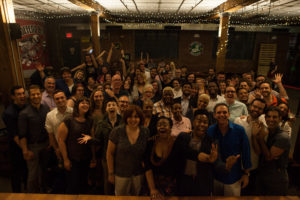In our last post of this series on community, Jordan Reeves shares his moving reflections on rediscovering the power of community through his own story of living authentically.
I grew up in Hueytown, Alabama. It’s the kind of place that values sweet tea over life. It’s hard to drive down the street without waving at every car that passes. There’s a church on every corner, and our politicians speak with a typical southern drawl.
In school, the bullies called me faggot. I wasn’t the only one they targeted. I became friends with another kid that endured the meanness that incubates on the playground. We made it through the tough times and were some of the happiest students in school when we managed to avoid the cruel kids. That was my first real taste of community.
To me, a community needs to share a common purpose. People can be interested in the same thing and never form a community. If those interests are fortified with purpose, however, community is inevitable. In school, I belonged to the ones-who-are-bullied community. Our purpose was survival.
As I grew older, the bullying became more sophisticated. It wasn’t as easy as sitting on the other side of the lunchroom. Homophobia existed all over Hueytown; it was in my home, school, and church. It was a systemic oppression that affected every part of my life. I am sad to admit, I was homophobic too. I called it the homosexual lifestyle, and I spoke out against it. I repressed my sexuality so deeply that I convinced myself I was not gay. I figured I could pray it away or trick others (and myself) into thinking I was not a gay man.
So, what did I do? I poured myself into the church. I had been attending church at least 3 times a week since I was in the womb. Church was my second home. After the bullying at school stopped, I didn’t share a real purpose with anyone outside of my church family.
My youth group was 300 students big – we were an army of teenagers all excited about serving Jesus (our shared purpose). I was a leader among them too. I taught a boys Bible study and Sunday school class. I went on mission trips all over the world, and completed at least 1,000 hours of overseas missionary service.
I remember standing in a stadium with 20,000 other students all singing the same song, Glorious by Chris Tomlin. The energy was palpable. Nobody cared if they were a good singer. The sheer volume of people singing in harmony drowned out any sour notes and left everyone feeling like they were part of what we all believed heaven would be – a communal worship service that lasted for all eternity. In that moment, I opened my eyes and looked around. I was overwhelmed with a sense of belonging. I was part of a community.
All this time, I had been battling my demons. I cried myself to sleep almost every night, and I started secretly meeting up with guys on Craigslist. My queerness wasn’t going away, so I had a crisis of faith. I held onto that moment in the stadium and said to myself, “I am a part of a community. Church is my community.” Meanwhile, another voice deeper inside me was saying, “Jordan! You don’t share their purpose. You can’t be a part of that community. They don’t want you.” I silenced the deepest voice and continued to live a lie.
One Sunday morning, I went to church, and the Director of Sunday School asked me to sign a declaration of my beliefs. One of the clauses read very simply, “I am not a homosexual, and I will not participate in homosexual activity.” Stunned and ashamed, I took the document, left the church, and I never returned.
For what seemed like years, I had no idea what it was like to be gay. I thought I must be the only one that had ever felt so lost. I couldn’t take it anymore. I had to tell somebody – I had to come out.
After I came out, my life changed. I shed the grief inflicted by the church’s homophobia. I fought the self, familial, and societal oppressions that prevented me from living authentically. And finally, I gained the community to which I always knew I belonged.
It’s not always easy. I still struggle with people that disagree with who I am. And LGBTQ people still face big challenges. That’s why I founded a nonprofit called VideoOut. Our mission is to amplify the LGBTQ voice. I hope that my story encourages the person living in a situation like I survived. I hope it breaks down the barriers and misconceptions and beckons others to shed their fears and uncertainties in exchange for a place of belonging. More than anything, I hope my story is a heartfelt invitation to join me and be a part of the LGBTQ community.


Leave a Reply